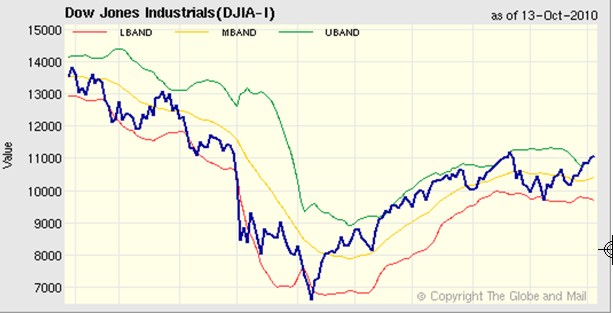What are commodities telling us?
Oct 18th 2010,
THE statistics pages at the back of The Economist have always been a useful guide, because they provide perspective from the daily volatility of the markets. So it is particularly instructive to look this week at our own commodity price index. Higher wheat and metals price have been hitting the headlines, so it is no surprise that the all-items index is up 8.4% on the last month. It is more surprising that it has risen 28.1% over the last year. Furthermore, this is not a boom that is driven by oil. The crude price has only risen 10.2% over the last year.
Now the bullish interpretation of these numbers is that the global economy must be strengthening if demand for raw materials is so strong. But the obvious question is why these numbers are not showing up in the general level of inflation? Indeed Ben Bernanke warned last week that the level of inflation was too low for comfort. Indeed, the core rate is just 0.8%.
Why aren`t higher commodity prices showing up in the CPI? In part, this is down to lags; in part, it`s down to the relatively small weight of commodities within the index. But it may be down to methodology. John Williams at Shadow Government Statistics runs an inflation measure that ignores all the methodological changes that have been made to the CPI since 1980; this has inflation running at 8.5%. A separate measure that ignores changes since 1990 has inflation running at 4.4%.
Some of the biggest changes have resulted from the use of hedonics. This adjusts the price of goods to allow for quality improvements, such as in the power of computing. David Ranson of Wainwright Economics makes the point that, while it is possible to adjust goods prices for improved quality, the process is much harder to achieve for services. In some cases, there may have been declines in service quality (the postal service comes to mind) that are not reflected in the index. This may have imparted a downward pressure on the official indices.
My feeling is that, if inflation were as understated as the Shadow numbers suggest, it would have shown up somewhere else in the numbers (by analogy, if a company is fiddling its profits numbers, the evidence will probably show up in the cashflow figures). No-one is suggesting that the annual wage growth numbers are artificially low. So if prices have been rising much faster than wages, wouldn`t that show up in declining consumer demand?
Nevertheless, I think the developed world should be worried about the commodities surge, not least because of what happened in 2008. There can be little doubt that the surge in oil prices that summer ate into consumer budgets at a difficult time. Higher food prices now are very bad news for those on low incomes, the unemployed and for the elderly living off the meagre income from savings accounts. Essentially, this is a tax rise for the west when the economy is already weak.
Incidentally, John Williams also produces the M3 numbers that occasionally get quoted on this post (the Fed no longer publishes the data). The latest numbers show an annual contraction of 4.9% in September. For Mr Williams, this is unequivocally negative news. He writes that;
The signal for a downturn or intensified downturn is generated when annual growth in real M3 first turns negative in a given cycle; the signal is not dependent on the depth of the downturn or its duration. The current downturn signal was generated in December 2009. The broad economy tends to follow in downturn or intensification roughly six to nine months after the signal, as has appeared to happen in recent months, with what formally should be recognized as a double-dip recession.
Source: Buttonwood - The Economist
ct%202010.jpg)
ct%202010.jpg)

